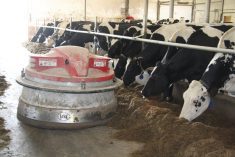A company wanting to build a cattle slaughter plant in Manitoba warned last week that it will look elsewhere if the provincial government does not show support for the venture.
Natural Prairie Beef Inc. wants to build an $11 million slaughter plant at Neepawa, Man., but an upgrade of the town’s overburdened waste-water treatment system is needed to accommodate the project.
Unless the province shares the cost of upgrading the water treatment, the company will consider building its slaughter plant in Saskatchewan, said Kelly Penner, a cattle producer and president of Natural Prairie Beef.
Read Also

Manitoba extends Crown land rent freeze
Manitoba government links the continued rental rate freeze on grazing and forage leases to economic and environmental challenges facing the industry
“We’re going to seriously look at that option,” he said during a news conference in Brandon on Jan. 5. “We’re not going to play around in Manitoba very long.”
Natural Prairie Beef was created through private investment, mainly from cattle producers. It is a sister company to Natural Valley Farms, which already is processing beef in Saskatchewan for a niche market in Canada.
The plant in Neepawa would slaughter 65,000 head of cattle per year on a single shift, said Penner. The meat would then be shipped to Natural Valley Farms in Saskatchewan for further processing.
Penner said the absence of provincial support in Manitoba is frustrating, especially in light of the backing pledged for Rancher’s Choice Beef Co-op, which is proposing a slaughter plant at Dauphin, Man., mainly for cull cattle.
The Manitoba NDP government has pledged an interest-free repayable grant of $4.5 million for Rancher’s Choice, plus up to $7 million in loan guarantees. That commitment hinges on a strong show of producer support, partly through investment dollars.
“Why can’t we get an interest-free repayable grant,” asked Penner in an interview. “They’re not even being close to fair here.”
Penner was accompanied at the news conference in Brandon by provincial Tory MLA Glen Cummings, who called on the province to sign a memorandum showing its commitment to share in the costs of upgrading Neepawa’s waste-water facility.
“We can be part of this exciting opportunity or we can be bystanders,” said Cummings, describing the Natural Prairie venture as a way to create jobs in Manitoba while helping producers capture a premium for their beef.
“My frustration is certainly parallel with Mr. Penner’s.”
The Natural Valley Farms processing plant in Saskatchewan is processing beef from 250 to 350 head of cattle per week, Penner said.
The intent is to reach 600 head per week in April, which is when the company expects to launch its Natural Valley brand.
The beef, derived from cattle that are raised without the use of growth hormones or antibiotics after weaning, is sold in Winnipeg, Toronto and Montreal. The retail co-ops in Saskatchewan also are buying, said Penner.
Producers have remained loyal to Natural Valley Farms despite the opportunity to get a higher price for their cattle by exporting them to the United States.
Penner and Cummings said their comments were not meant to undermine the Rancher’s Choice effort.














